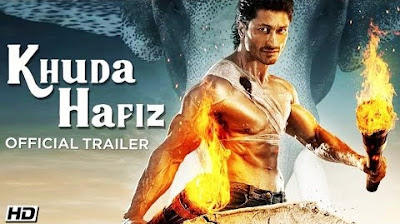Khuda Haafiz Review, 2020: Vidyut Jammwa
When you watch a Vidyut Jammwal film, the first question is: When does the fighting start?
For almost a decade now, Vidyut, who is famous for doing his own stunts
and whose skills include the ancient martial art Kalaripayattu,
has been decimating bad guys onscreen with finesse.
His films, like the Commando franchise, position him as a one-man army,
who pummels, slices, kicks and pirouettes.
Nothing can stand in the way of the Jammwal offensive.
In Commando 3, he saved India, while keeping his man bun in place.
In Khuda Haafiz, writer-director Faruk Kabir tries to expand the Vidyut Jammwal repertoire.
The film has been inspired by a true incident and the fighting doesn’t begin until around minute 56.
Until then, Khuda Haafiz establishes the love story between ,Vidyut
playing a Lucknow-based software engineer Sameer and his newly wed wife, Nargis.
It’s a Hindu-Muslim arranged marriage, but Faruk doesn’t explore this intriguing premise further.
The couple is grappling with more practical realities, like a global recession.
It’s 2008.
After losing their jobs, both apply to companies in the fictional Middle-Eastern country of Noman.
Nargis leaves first, but disappears from the airport.
A distraught Sameer follows to unravel the mystery of his missing wife.
The set-up isn’t new.
The missing wife has been a trope in cinema for decades.
In fact, Roman Polanski’s 1988 film Frantic, had a similar situation of a man,
Dr. Richard Walker played by Harrison Ford, searching for his wife in a foreign country, France,
where language becomes a stumbling block.
20 years later, Liam Neeson was also looking for his missing daughter in Paris in the blockbuster Taken.
Faruk tries to build authenticity and suspense by having characters speak extensively in Arabic,
only some of which is translated for the audience.
The idea, the director has said,
is for viewers to experience the same sense of frustration and desperation that Sameer does.
Which might be good in theory, but in practice, it stalls the movement and makes the film dreary.
Annu Kapoor, playing Usman, an impossibly helpful taxi driver, livens up the frame momentarily.
Usman speaks Hindi, which makes Sameer’s and our lives a little easier.
But the screenplay isn’t tight enough to create the sense of urgency that Sameer feels.
The plot plods along for almost an hour, until the first action set-piece arrives.
I got happier when Vidyut clenched his fists.
The action, choreographed by Ivanov Victor and Andreas Nguyen, is raw and furious.
The first few minutes are staged in this long narrow corridor,
while Sameer is sort of plunging this knife, into all these men who are trying to hold him.
Bones break with a crunching sound and one man’s jaw is split apart by the edge of a wall.
It’s not an easy watch.
Once the fighting begins, the visuals get more grotesque,
at one point,
Sameer is having a conversation with a man, who has this fork and a knife sticking out of his body.
It’s both brutal and unintentionally comical.
Khuda Haafiz has been extensively shot in Uzbekistan.
Faruk and DoP Jitan Harmeet Singh make good use of the landscapes –
from the singular architecture and sand-colored homes, to the barren highways.
At one point, we get a Mad Max-style chase, with swirling clouds of dust.
For a change, Vidyut is playing a savior, who isn’t in superman mode.
Sameer gets hurt and bleeds. He faints and even sheds tears.
The story requires Vidyut to deliver a range of emotions.
He pushes himself, but is still most convincing, when he is inflicting pain.
Shivaleeka Oberoi, who plays Nargis, has little to do, except first be childlike and naïve
and then wait to be saved.
Faruk works hard to infuse a gritty realism into the narrative,
but ultimately Khuda Haafiz falls into that same sort of silly territory,
that Vidyut Jammwal action movies often do.
Logic exits the frame.
The villains become more outlandish.
Nargis, despite her ordeal, continues to look surprisingly fresh-faced and healthy.
Indian actors like Shiv Pandit and Aahana Kumra, playing Noman locals with clumsy accents doesn’t help.
Neither does the stilted dialogue – at one point, Usman tells Sameer:
"Tum jisko karz kehte ho, Pathan usey farz maanta hai".
Usman of course, is the latest, in the long line of courageous and loyal Pathans in Hindi cinema,
going back to the iconic Sher Khan in Prakash Mehra’s Zanjeer.
Khuda Haafiz wants to be both – an emotional love story and an unflinching action drama,
but it falls somewhere in between.
You can watch the film on Disney+Hotstar.













No comments